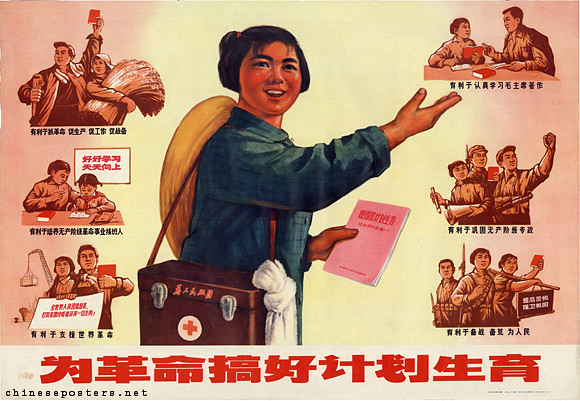State Feminism in China
(ChinesePosters: "Practive birth control for the revolution")
The Constitution of the PRC states that “Women in the People’s Republic of China enjoy equal rights with men in all spheres of life, in political, economic, cultural, social and family life.” However, this idealized situation is far from the reality in modern China. With deep-rooted traditions in Confucianism, China has always been a country dominated by its entrenched patriarchal ideology of social and familial hierarchy. Despite China’s championing of women’s liberation through initiating pro-women policies and creating a state-operated women’s organization, the All-China Women’s Federation, in the 1950s, the mobilization remains ineffective, as there are discrepancies between official rhetoric and reality.
Since the founding of the People’s Republic of China in 1949, women’s rights in China have become part of the Chinese Communist Party’s ideology to advance the nation. In their vision, equal participation of women in the economy and society is integral to becoming a better nation. As the first act passed by the CCP after the revolution, the Marriage Reform Law symbolizes CCP’s increasing attention on feminism. Enacted on May 1, 1950, the law sought to secure women’s rights for problems derived from marriage and family life, representing a radical change for Chinese women. It progressively raises women’s position in the domestic sphere, such as abolishing forced marriage, allowing women to keep their family names, and guaranteeing ownership of family properties. After that, more new policies and activities—such as the founding of a state-led feminist institution, the All-China Women’s Federation—ensued.
(Social maintenance fee for Connie)
Another example of new policies protecting women is the one-child policy. Under this policy, every couple can only have one child. Any couples who have extra children have to pay the social maintenance fee as a consequence. In my family, my parents had to pay ninety thousand yuan (equivalent to ten thousand dollars) for having me, the second child. In addition to reducing the surging population growth, the one-child policy also aimed to liberate women from the responsibility for bearing children so they could join the workforce.
However, progressive official policies do not translate to the complete eradication of the deep-rooted inequality between men and women. The traditional ideology still impedes women from being truly emancipated.

